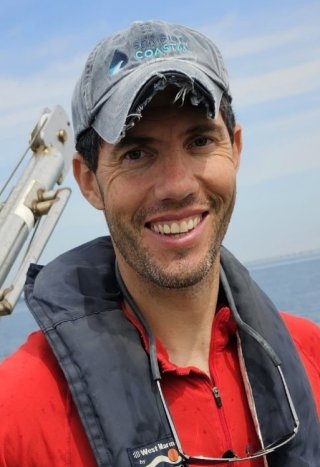Meet EPA Water Quality Modeler Brandon Jarvis, MS

EPA water quality modeler Brandon Jarvis develops and implements state-of-the-art water quality modeling tools to address nutrient issues in coastal and freshwater ecosystems. His research combines innovative field measurements with water quality models to inform ecosystem condition and recovery from nutrient-related stressors, such as low dissolved oxygen and harmful algal blooms.
Tell us about your background.
I have a master's in environmental science, with my master’s degree focusing on sediment biogeochemistry in estuarine ecosystems. I’ve worked on a lot of different environmental and science related projects throughout my career, including ecological risk assessment, watershed and stormwater modeling, wetland evaluations, and water quality modeling in support of total maximum daily load (TMDL) development.
What are you working on right now?
I am currently working on the development and application of our newly publicly released water quality model CGEM (Coastal Generalized Ecosystem Model). In addition to improvements to the model code I am working to implement the model to address important and challenging water quality issues at varying scales, from hourly dynamics in shallow estuaries to the dead zone in the northern Gulf of America.
When did you first know you wanted to work in environmental science?
When I started my undergraduate degree, I envisioned practicing environmental law. As I completed my studies I found that I enjoyed the implementation of science and research more than specific policy implementation, and ended up focusing on practical science courses.
What do you like most about your job?
My job is different each and every day, allowing me the opportunity to work in the field, the laboratory, and at my desk developing modeling tools. As an ecologist and a modeler I really enjoy developing models using data that we collect and measure in our own laboratory, and it’s great to see how these measurements can be used to improve our modeling tools.
How does your science matter?
Our science matters because we are improving the way complex water quality modeling tools are implemented for policy development and decision making. Our modeling tools help forecast ecosystem recovery under proposed management scenarios, providing decision makers with the information needed to develop effective and sustainable management solutions to complex environmental problems.
If you weren’t a scientist, what would you be doing?
I would probably be running a kayaking and eco-tour company somewhere tropical. I love teaching others about the natural environment while being outdoors myself, and I can’t think of many ways to do that better than on a kayak every day.
What advice would you give a student interested in a career in science?
The best advice I can give is to start developing your coding skills early. So much of modern science relies on large and computationally challenging datasets that require coding skills to effectively navigate. Regardless of your scientific field of interest there is almost always a demand for technical coding skills.
If you could have dinner with any scientist, past or present, who would you choose and what would you talk about?
I would definitely have dinner with Jacques Cousteau. I read many of Jacques’ books in high school and college and would love to hear stories about his early pioneering exploration of the underwater environment.
Editor's Note: The opinions expressed herein are those of the researcher alone. EPA does not endorse the opinions or positions expressed.
